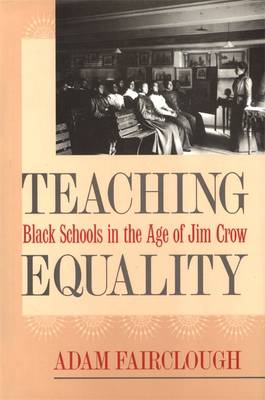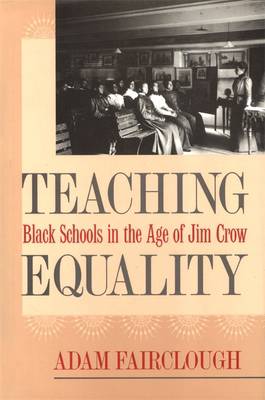
- Retrait gratuit dans votre magasin Club
- 7.000.000 titres dans notre catalogue
- Payer en toute sécurité
- Toujours un magasin près de chez vous
- Retrait gratuit dans votre magasin Club
- 7.000.0000 titres dans notre catalogue
- Payer en toute sécurité
- Toujours un magasin près de chez vous
Description
In Teaching Equality, Adam Fairclough provides an overview of the enormous contributions made by African American teachers to the black freedom movement in the United States. Beginning with the close of the Civil War, when "the efforts of the slave regime to prevent black literacy meant that blacks . . . associated education with liberation," Fairclough explores the development of educational ideals in the black community up through the years of the civil rights movement. He traces black educators' connection to the white community and examines the difficult compromises they had to make in order to secure schools and funding. Teachers did not, he argues, sell out the black community but instead instilled hope and commitment to equality in the minds of their pupils. Defining the term teacher broadly to include any person who taught students, whether in a backwoods cabin or the brick halls of a university, Fairclough illustrates the multifaceted responsibilities of individuals who were community leaders and frontline activists as well as conveyors of knowledge. He reveals the complicated lives of these educators who, in the face of a prejudice-based social order and a history of oppression, sustained and inspired the minds and hearts of generations of black Americans.
Spécifications
Parties prenantes
- Auteur(s) :
- Editeur:
Contenu
- Nombre de pages :
- 114
- Langue:
- Anglais
- Collection :
- Tome:
- n° 43
Caractéristiques
- EAN:
- 9780820322728
- Date de parution :
- 01-02-01
- Format:
- Livre relié
- Format numérique:
- Genaaid
- Dimensions :
- 147 mm x 217 mm
- Poids :
- 294 g

Les avis
Nous publions uniquement les avis qui respectent les conditions requises. Consultez nos conditions pour les avis.






